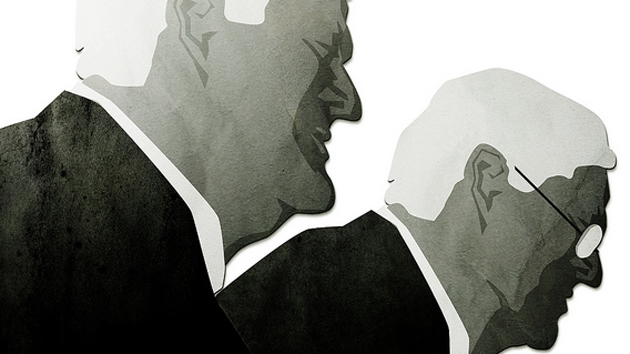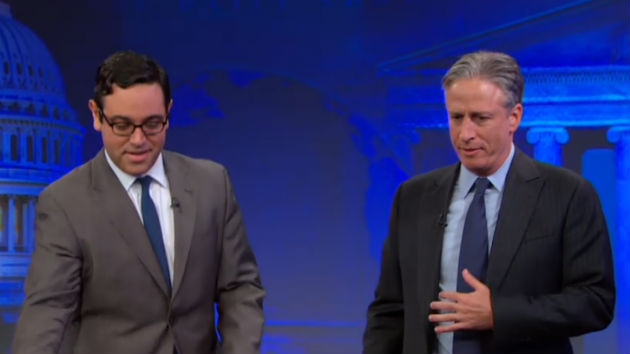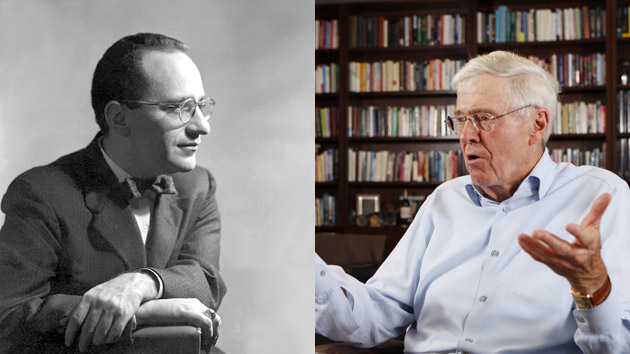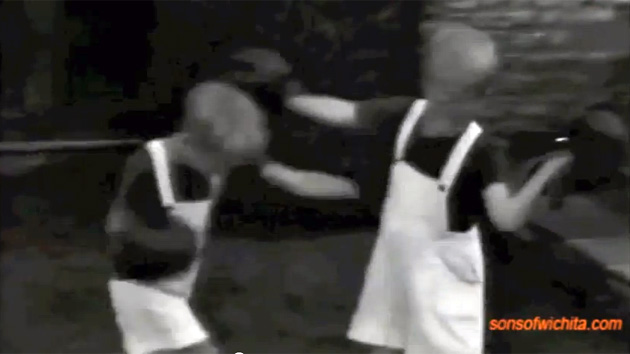
<a href="https://www.flickr.com/photos/truthout/9415761283/in/photolist-fm3eMM-fm3cyz-7kq9Hr-avc1Np-gbqWFR-caz7Xb-jbFwAG-caz1RJ-9wcTPn-7mLAMh-dR9auP-bbL9cZ-7GVTsH-7Dwe2e-caz37C-ftXmDL-7MAJgZ-7C326c-7tGiLd-czsVys-czsUtG-87ebMU-7TC1Ys-7VtV7Q-6erz63-bu7YWi-bbL9s2-asUn64-87aZ5x-8cXBsy-7tGjvY-mEsfCb-jbHkKw-dReJs5-7AeJSz-bbL5jD-dR9aR6-gbrncq-7NcGKk-7aghVH-dUZoPs-dReJa9-aoFqSb-dReJAs-jbFoAd-79eX4D-79PsXL-7PWoGo-bbLayF-ftH7Dg">Jared Rodriguez</a>/Flickr
Oscar-nominated filmmakers Carl Deal and Tia Lessin were steeped in the production of a documentary on the influence of money in politics, but it wasn’t until funding for their project was unceremoniously yanked last year that the power of big donors truly hit home.
The pair had received a $150,000 commitment from the Independent Television Service (ITVS), a Corporation for Public Broadcasting-funded organization that bankrolls projects aired on PBS. They would later learn that their film, Citizen Koch, which explores the post-Citizen United political landscape and the rise of the tea party, had touched a nerve among public television officials worried about angering a generous benefactor, David Koch, who served on the boards of Boston’s WGBH and New York City’s WNET. In the fall of 2012, PBS had aired Alex Gibney’s Park Avenue: Money, Power and the American Dream, which featured a highly unflattering portrait of the billionaire, including an interview with a former doorman at Koch’s elite Manhattan apartment building who singled him out as its most miserly resident. Public television officials were sensitive about offending Koch again.
ITVS would later insist that “early cuts of” the film “did not reflect” the original proposal, and that the film had not been officially contracted, but there was reason to believe that the filmmakers had fallen victim to the influence of big money. There is no evidence that David Koch played a direct role—or that he has ever had any role in programming decisions—but his bank account speaks for itself. As Buddy Roemer, a main character who made the scourge of political cash the centerpiece of his dark horse presidential bid, points out in the film, “money is a weapon.” You can unleash it, or merely use it as a deterrent.
Their project in jeopardy, Deal and Lessin turned to Kickstarter, where they raised nearly $170,000 in donations from about 3,400 contributors to complete Citizen Koch. The film recently debuted in theaters nationwide. We’ll chat with its creators after the trailer.
Mother Jones: I know you guys previously did a film on Hurricane Katrina and worked on the Michael Moore film ???Capitalism: A Love Story?. What was the genesis of this particular project?
Tia Lessin: ?It was Carl.
Carl Deal: ?She blames me, but the story she likes to tell is that I was watching too much Glenn Beck in the aftermath of Obama’s election. It was pretty remarkable how the public discourse shifted after Obama was elected. People thought they could say anything that popped into their heads. And I guess constitutionally you can, but it certainly doesn’t help inform people. So Fox News was pretty entertaining at the time. We were coming off a successful documentary, ?Trouble the Water?, and I was just chillin’—with Glenn Beck.
TL: ?I mean, it was the ugliest political rhetoric ever. It was horrifying. And it was not just mean-spirited; it was racist. We wanted to know what was behind it.
?CD: ? The tea party was rising, and I think a lot of us were wondering, “How in the hell do these working Americans, many of whom are reliant on public assistance—veterans or elderly folks—what are they doing carrying the water for the corporate backers and the tea party? We had known a little bit about the Kochs. Years ago, I had written a guide to anti-environmental organizations. This was in ’92 or ’93, I guess. The Kochs were popping up behind a lot of these organizations—Citizens for a Sound Economy, for example, which essentially split into FreedomWorks and Americans for Prosperity (AFP), which are together the mothership for the tea party. So I was pretty keenly aware of how strategic they were with their unofficial lobbying activities. We didn’t know really the extent of how creatively involved they would get in elections. ?Citizens United ?was just in its infancy in 2011.
?TL: We wanted to follow the money, but we also wanted to understand what ?Citizens United ?was and try to make sense of that decision. Because when we heard about it, people were talking about it in bumper stickers, and we didn’t really understand the nuances. So part of what we tried to do is understand the political maneuvering that gave us that decision.
?MJ: ?How do you see ?Citizens United ?affecting the Kochs and their political operation? Because they had a very robust political presence prior to that decision.
?CD: ?Well, ?Citizens United ?created a menu of options for hiding political spending. It made it easier. Remember, Americans for Prosperity, the foundation and its 501(c)(4), are both corporations. They’re nonprofits, but they’re corporations, and so they’re able to shield their contributors in ways. Citizens United’s? logic applies to them as well in terms of the political spending they can do—though AFP denies that what they do is electioneering.
?TL: ?They’re a money-laundering operation that’s perfectly legal. Corporations are still cautious about being associated with political spending, and so they turn to groups like AFP to hide that money trail. So far, it’s been pretty effective.
MJ: ?Last May, Jane Mayer wrote a New Yorker story about how you lost your Independent Television Service funding after Alex Gibney’s film aired on WNET. Tell me what happened with that relationship, and what has transpired since Mayer’s piece appeared.
TL: ?We had a great relationship. They were thrilled to have this commission, and they were looking forward with us to, hopefully, a Sundance premiere. All was going smoothly, and then something changed. Until Jane’s article, we didn’t understand exactly what. After Gibney’s film aired, the president of the PBS affiliate in New York called ITVS and threatened to pull WNET out of ?Independent Lens, ?ITVS’ documentary series, because he was so angry about, I guess, being undercut by the Gibney piece. A few days later, ITVS called us and threatened to remove our funding if we didn’t change the name of the film. Jane found out that David Koch had contributed about $23 million to PBS. It was shocking to us. At the time, we didn’t know about this phone call; we didn’t know that ITVS’s very existence was in jeopardy because of this other film.
??CD: ?We had this series of strange phone calls where they were not being entirely direct with us, so Tia decided to be direct. She Googled “David Koch and PBS” and discovered, you know, pretty easily. It’s embarrassing that we didn’t actually know that before we went into business with them, but we were focused on the film, and it never would have occurred to us that David Koch was investing in public broadcasting, because ideologically he’s opposed to public broadcasting.
?TL: ?AFP has actually taken a stand against government funding of PBS.
?CD: ?Tia got the Google search results in the middle of this call, and it said David Koch was on the board of WNET and WGBH, and she asked them point blank, and they said “yes.” They said that there’s…
?TL: ?…a climate right now in public broadcasting that would find this title unbroadcastable.
?CD: ?What’s discouraging is that it’s a public agency that’s 100 percent funded by the Corporation for Public Broadcasting. They don’t need to rely on private donations. They’re charged with supporting independent media makers. For a lot of independent filmmakers the ?Independent Lens ?series is sort of the Holy Grail because you’ve got a massive, free TV audience.
MJ: ?From my understanding, David Koch didn’t say anything. He was upset about Gibney’s Park Avenue as you might be if you were the subject of a critical film. But he didn’t ask for—
TL: ?He didn’t need to. Just the impact of his money and his position of power over the two biggest affiliates of the system had an impact, clearly, on their editorial decisions. They wanted us to take the word Koch out of our title, and scrub the film of any reference to the Kochs. That’s what they told us to do, and we said no. When we realized that the request was coming because they were trying to essentially placate their donor, we were offended and we felt that we had to say something. And we did.
?MJ: ?What was the upshot of IVTS pulling your financing?
?TL: ?They left us in a hole, a $150,000 pile of debt, just as the big-ticket money items were coming, too: the cost for archival licensing and distribution that would allow us to get this film out there. It put us in a deep, dark place, frankly.
?CD: ?But we dug out of it. We turned to Kickstarter, and it was really amazing. More than 3,000 people—mainly people we didn’t know—rallied together and made up our funding deficit in 30 days.
?TL: ?I think 3,400 people donated on average about $50.
?MJ: ?The Buddy Roemer model.
?TL: ?Exactly! What was also uplifting was hearing from all these people. A lot of them made an effort to communicate directly why they were putting out this money. They cared deeply about the integrity of public media. So they not only just wrote us a check, they joined us in this crusade to get this film out there.
?MJ: ?How did Wisconsin become your focal point?
?CD: ?We didn’t know how important the Kochs were in what was unfolding in Wisconsin, but little by little information came out that showed that they were big players—big supporters of Gov. Scott Walker who were helping to set the agenda. [AFP president] Tim Phillips had a huge presence in the state. In fact, the two local leaders of Americans for Prosperity in Wisconsin were on the staff of [Assembly Majority Leader] Scott Suder, who was leading the charge to get Governor Walker’s Act 10 passed—the union-busting bill.
?TL: ?Wisconsin gave us a chance to be on the ground and watch as AFP’s bus tours circled around the state and their ads flooded the airwaves—as their playbook, essentially, was being enacted by Walker. He, Rick Snyder, John Kasich, Paul LePage—they were the post-?Citizens United ?governors that went after organized labor in a big way. And we didn’t understand until we were deep into Wisconsin that that was less about the fiscal crisis and wages and pensions and much more strategic.
?MJ: ?The idea of de-funding the left by going after labor.
?TL: ?That’s our thesis. And we didn’t hear that from the AFL-CIO; we heard that from Karl Rove. Wow! It was like a light bulb. Why did they care about organized labor so much? We realized that ?the empowerment of both unions and corporations possibly was a problem for these guys. And labor seemed to us the bulwark for the interests of working people, and that’s why they were going after them so.
MJ: In the film, a Wisconsin union member who identifies as Republican calls herself a Reagan Republican. And yet, Walker’s attack on the unions was inspired by Reagan’s firing of the striking air traffic controllers.
TL: Beginning of the end of organized labor! I’ll say this, Wisconsin is an interesting place. It was the birthplace of the Republican Party and public employee unions. It’s a birthplace of progressivism, and that goes both for the right and the left. There is a progressive Republican streak there. We went to the little white schoolhouse in Ripon, where Republicanism was born, and their mottos were free man, free soil, free education.
CD: It was like a hippie commune!
TL: If you look at mainstream media depiction of Republicans, you don’t see these people, you don’t hear their voices. We were curious what they had to say. And you certainly don’t see Republican labor.
MJ: There are less and less of them around.
CD: But are there? See, that’s the thing that’s interesting. There are a lot of them around in Wisconsin.
MJ: I meant in elected office, because a lot of the pro-union Republicans have been picked off by groups like AFP.
TL: Yeah. It’s created this extremism. We spent time with Trevor Potter, who was the Republican head of the FEC and the McCain-Palin general counsel, and he is very critical of Citizens United.
MJ: You also interviewed Floyd Abrams, the First Amendment lawyer who represented Sen. Mitch McConnell in Citizens United. He seemed very candid, and said, you know, this decision might lead to freer elections, but it won’t necessarily lead to better people getting elected.
TL: This isn’t in the film, but I said, “Look, Citizens United is about outside spending. Do you think there’ll be a day when this will be applied to direct contributions?” He said, “The logic of Citizens United will absolutely apply to direct contributions.” And in fact that’s what happened with McCutcheon.
MJ: Buddy Roemer calls President Obama a “participant in the fraud.” Obama decried super-PAC spending initially, only to come around and embrace it. And you have a lot of Democrats who are in favor of campaign finance reform theoretically but have embraced the new Wild West of campaign spending so they don’t get left behind. Do you think the Democrats helped solidify this system by participating, and creating groups like Priorities USA and the outfits that are run by David Brock.
TL: Yeah. This is a transpartisan issue.
CD: But here’s the thing. When the big money comes in, it makes it harder for certain people to run for office. It limits the pool of candidates severely, whether it’s Republicans or Democrats spending the money. And it’s bad.
TL: It also limits the conversation, because as you know, this money gets spent on broadcast ads to inform and in many cases misinform the public. And so this conversation translates into our public agenda: what we care about, what policies get prioritized. I’m an independent. I have a lot of problems with both parties, but this spending is something everyone needs to care about.
CD: It’s a game. The right envies the organizing power of labor on behalf of Democratic candidates, so they want to try and figure out how to replicate that, because that’s the last piece they need to put in place. But in the last midterm elections they ran every campaign ad against Obama and Pelosi. Now the Democrats are sort of taking that bait and saying all of our ads are gonna be running against David and Charles Koch. Neither one of those strategies informs the public about the candidates. It’s just bad for democracy.
MJ: What’s next for you guys? Have you started work on your next project?
CD: Yes and no. We have a few irons in the fire.
MJ: Is it on campaign finance?
CD: No. Total left turn.
TL: Romantic comedy.
CD: Yeah, we’re looking to make friends.













